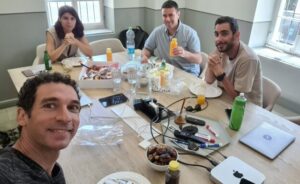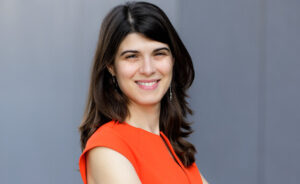
This is already a well-known anecdote: it took the Moderna company two days to develop the corona vaccine from the moment it had the RNA sequence of the virus. But what was more complex, it turns out, was finding how to introduce the vaccine into the body.
There are two challenges: the first is the challenge of developing the drug itself, and there is the second challenge, which is the delivery,” explains Yogev Debi, CEO and founder of Mana.bio, a biotech company that is now being revealed. When an RNA molecule enters the body, it is dangerous for it, so it immediately breaks it down. Therefore, it is wrapped in a collection of special molecules that constitute a camouflage from the body, until the substance enters the cell in the body, and then this protection breaks down inside the cell.”
What Mana.Bio is doing, as befits an Israeli startup, it will use Intercom to transfer molecular visualization to a larger delivery through database analysis. “Where’s the date from?” Debbie asks and answers “There are many experiments that have been done in the last 20 years and published, whether they help in an article or a patent. And he knows how to predict a molecule that will work, which is what a chemist does. We don’t always know how to explain. And to jump to the end, we succeeded for the first time using AI to predict a molecule Carry and reach places in the body that were very difficult to reach until now, such as the spleen and lungs, and we also managed to skip the liver.” The liver is, as we know, the great filter of the body.
Mana.Bio deals with this challenge, finding the molecular formulation that will suit the transport of the drug in the body. “The professional term is LNP,” Debi explains, “an acronym for lipid nanoparticles – a fatty nano particle, but I like to use the example of an astronaut and a spaceship. The astronaut needs the spaceship to pass through the atmosphere, and this is a complicated challenge, because the ‘spaceship’ must not disintegrate Along the way, it depends on the size of the ‘astronaut’ it carries, the destination in the body it needs to reach and no less important – where not to go.”
According to Debbie’s explanation, Pfizer’s storage limitations are not because of the vaccine molecules themselves but because of the envelope molecules. According to him, Pfizer was not able to achieve good enough shell molecules so that they could exist in any environmental conditions, so they settled for the minus 81 degrees they had and with that they set off – of course this affected the transport of the vaccine, the destinations the vaccine reached and the price ranges.
In fact, everything depends on the transport spacecraft, if Pfizer had another one, with a higher capacity – the vaccines would have managed to reach Africa as well. So far, Mana.bio has raised a seed round of $5 million from the Lion Bird Fund and Gigi Levy’s NFX Fund, which previously also invested in Genome Compiler.
Mana focuses on the hot field of gene therapy. The National Academy of Sciences explains: “Gene therapy is a technique that harnesses genes to treat or prevent diseases by introducing genetic material into cells to compensate for abnormal genes, or to produce a beneficial protein. In order for a gene inserted directly into a cell to work, the genetically engineered carrier is often required to carry the garden in its place.”
Mana is trying to bring a new approach to the development of the carriers. “The way in which pharmaceutical companies today develop ‘spaceships’ is traditional, classic scientific tools of trial and error, but it is very difficult to develop innovative solutions that way,” explains Prof. Avi Schroeder, the company’s scientific partner. He adds, for example, that today in the classic formulation of a carrier there are only 4 types of molecules, and science plays a bit with the dosages and at most adds one component to the formula.

Founders of Mana.bio. “We don’t care if an experiment was successful or not, because in any case the machine learns and becomes smarter”
Photo: Mana. bio., public relations
From developing DNA design using a computer to cure diseases
Mana.bio was founded in October 2021 by four “stars”. Debi himself and his partner Roy Nebo were co-founders of Genome Compiler, a pioneering biotech company that developed a platform for designing DNA using a computer. The company was sold in 2016 to the American Twist Bioscience in a successful exit, and the activity in Israel continues to this day. Debi believes that to a large extent Mana.Bio is the natural continuation of Genome Compiler: “Today we are dealing with the next step, of inserting the genetic sequences into the cells of the body in order to cure diseases.” Nebo is the CTO of the company.
The knowledge on which Mana is based is the academic knowledge of Prof. Avi Schroeder and Prof. Kira Radinsky from the Technion, and the company signed an agreement to commercialize knowledge with the Haifa institution. The two professors are scientific partners but not holders of a permanent position.
Where is the company today?
“We are in the stage of building the platform,” replies Debi, “one side is to collect the data and all the algorithms. The other side is a wet lab where experiments are done on cells or mice.” I mean, after the computer suggests the formula, you also have to check that it works. “We do experiments on a daily level and, somewhat contrary to normal science, we don’t care if an experiment was successful or not, because in any case the machine learns and becomes smarter.”
Debi estimates that it will take two more years for the company to start seeing revenues, mainly from pharmaceutical companies that want to make use of the capabilities it has developed and use Mana to build “spaceships” for its astronauts and thus reach the market faster with medicines. “We heard from the pharmaceutical companies that we can save months to years of development,” says Debi. “Machine learning algorithms can now learn from years of information from experts and within hours produce molecules with a high chance of producing a targeted drug,” Radinsky adds.

Prof. Kira Radinsky. “Machine learning algorithms can now learn from years of expert information”
Photo: Omer HaCohen, Public Relations
In the longer term, Mana wants to develop a drug or drugs herself. The company is looking at diseases such as cystic fibrosis and Duchenne, but it is too early to say what the first solution it will choose to promote will be. In any case, the company’s entrepreneurs are ready for the long journey: “This is not SaaS and no longer a replacement for Google Sheets or a marketing optimization system. The world of biotech is slower and it will take us longer to reach the market, but we wanted to do something that would improve people’s lives,” Debi explains. The company employs 19 people from its offices in Tel Aviv and Haifa; From life sciences people, through chemical engineers to software and artificial intelligence people.